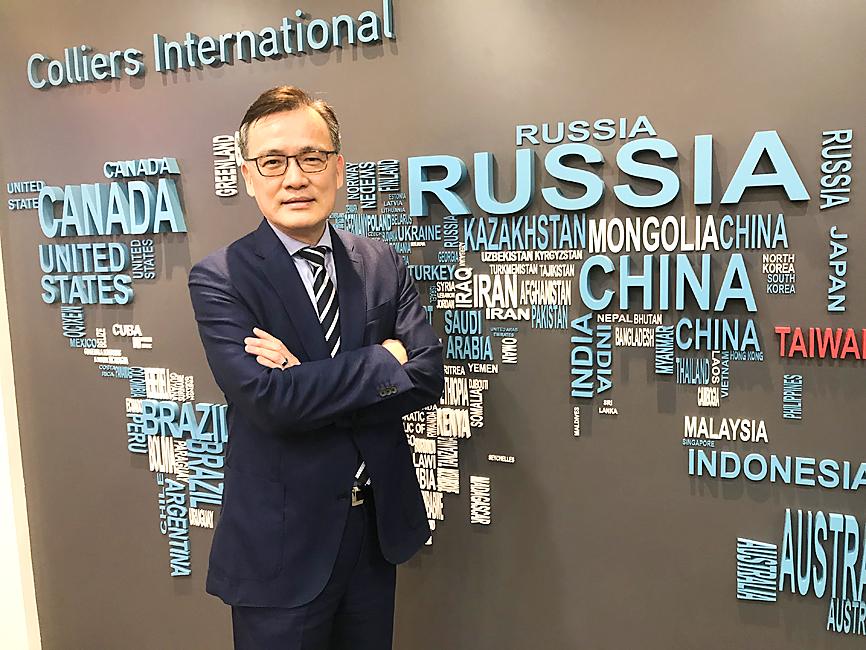Demand for warehouses and logistics facilities has spiked in the past few years, aided by booming online shopping and port congestion amid the COVID-19 pandemic, Colliers International Taiwan (高力國際) said yesterday.
The past three years have seen 22 major transactions of warehouses and logistics facilities valued at NT$29.94 billion (US$1.05 billion) and covering 209,100 ping (690,030m2), the size of 2.3 Daan Forest Parks in Taipei, the property broker said.
Colliers Taiwan managing director Andrew Liu (劉學龍) identified three investment approaches in warehouses and logistics facilities, namely by taking up the role of landlords, service providers and operators.

Photo: Hsu Yi-ping, Taipei Times
Cathay Life Insurance Co (國泰人壽) and Chunghwa Post Co (中華郵政) are landlords to several warehouses and logistics facilities that generate rental incomes equal to 4 percent of annual returns, Liu said.
Ally Logistic Property Co (永聯物流) offers warehousing and logistics solutions for clients in electronics and retail sectors, a business model that provides higher returns than rents, Liu said.
Meanwhile, companies such as food and beverage conglomerate Uni-President Enterprises Corp (統一企業), supermarket chain operator PX Mart Co Ltd (全聯實業) and e-commerce operator Momo.com Inc (富邦媒體) buy plots and build their own warehouses and logistics facilities to meet operational needs, Liu said, adding that their business scales are large and their pockets deep enough to warrant such a strategy.
Most warehousing deals are concentrated in Taoyuan’s Guanyin (觀音), Gueishan (龜山), Dasi (大溪) and Lujhu (蘆竹) districts; New Taipei City’s Wugu District (五股); Keelung; and Hsinchu’s Hukou Township (湖口), Collier Taiwan said.
Solid demand has pushed up industrial plot prices by 40 percent since 2018, the broker said.
Warehouses and logistics facilities are sparse in Taichung, Tainan and Kaohsiung, as well as Changhua County, but their numbers might increase in central and southern Taiwan in the coming years on the back of emerging industrial clusters and land scarcity in the north, Collier Taiwan said.
Industrial plots of more than 10,000 ping and near highway entrances are ideal sites for warehouses and logistics facilities, it said.
Apart from Cathay Life, Nan Shan Life Insurance Co (南山人壽) and Transglobe Life Insurance Co (全球人壽) also have displayed investment interest in warehouses and logistics facilities, it said.

Vincent Wei led fellow Singaporean farmers around an empty Malaysian plot, laying out plans for a greenhouse and rows of leafy vegetables. What he pitched was not just space for crops, but a lifeline for growers struggling to make ends meet in a city-state with high prices and little vacant land. The future agriculture hub is part of a joint special economic zone launched last year by the two neighbors, expected to cost US$123 million and produce 10,000 tonnes of fresh produce annually. It is attracting Singaporean farmers with promises of cheaper land, labor and energy just over the border.

US actor Matthew McConaughey has filed recordings of his image and voice with US patent authorities to protect them from unauthorized usage by artificial intelligence (AI) platforms, a representative said earlier this week. Several video clips and audio recordings were registered by the commercial arm of the Just Keep Livin’ Foundation, a non-profit created by the Oscar-winning actor and his wife, Camila, according to the US Patent and Trademark Office database. Many artists are increasingly concerned about the uncontrolled use of their image via generative AI since the rollout of ChatGPT and other AI-powered tools. Several US states have adopted

A proposed billionaires’ tax in California has ignited a political uproar in Silicon Valley, with tech titans threatening to leave the state while California Governor Gavin Newsom of the Democratic Party maneuvers to defeat a levy that he fears would lead to an exodus of wealth. A technology mecca, California has more billionaires than any other US state — a few hundred, by some estimates. About half its personal income tax revenue, a financial backbone in the nearly US$350 billion budget, comes from the top 1 percent of earners. A large healthcare union is attempting to place a proposal before

KEEPING UP: The acquisition of a cleanroom in Taiwan would enable Micron to increase production in a market where demand continues to outpace supply, a Micron official said Micron Technology Inc has signed a letter of intent to buy a fabrication site in Taiwan from Powerchip Semiconductor Manufacturing Corp (力積電) for US$1.8 billion to expand its production of memory chips. Micron would take control of the P5 site in Miaoli County’s Tongluo Township (銅鑼) and plans to ramp up DRAM production in phases after the transaction closes in the second quarter, the company said in a statement on Saturday. The acquisition includes an existing 12 inch fab cleanroom of 27,871m2 and would further position Micron to address growing global demand for memory solutions, the company said. Micron expects the transaction to